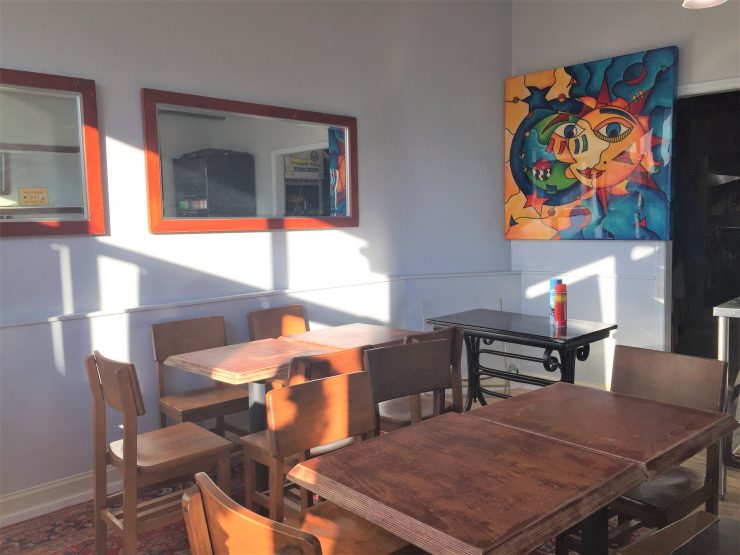During the early stages of the pandemic, many businesses had to reduce their staff and shift to delivery to adapt. Now, more than a year later, they’re struggling to find employees, according to the Bureau of Labor Statistics and D.C. business managers.
Michelle Molotsky, manager of the business improvement nonprofit District Bridges, said the food industry in particular has suffered from a labor shortage.
“The big issue for businesses is there’s been a real shift in the labor force. They call it ‘The Great Resignation.’ A lot of people in the food service industry have quit to do other things,” Molotsky said.
The Bureau of Labor Statistics reported that the number of people leaving private industries was at a historic high in September, with the food industry representing the highest departure percentage: 6.6% compared to the total average of 3.4%.
Now, restaurant owners like Seth Hajbi are working overtime and are struggling to meet labor quotas. Hajbi runs DC Shawarma, a Lebanese restaurant that he opened on 6th Street NW just before the pandemic hit.
“The major challenge has been labor. You have to have adequate staffing in order to operate. What I’m doing is suicidal with a staff of two,” Hajbi said.
When one of his chefs caught COVID-19, Hajbi had to close his business and reduce his staff at his restaurant. Many of the remaining employees left D.C. for other cities like Baltimore or Chicago to find work while the restaurant was closed. After reopening his business, he’s been unable to find people who are willing to work.
Finding new retail workers to replace those who have quit has also been challenging. A report from the Bureau of Labor Statistics shows the rate of retail employees quitting was 4.4% in September.
Pixie Windsor is owner of Miss Pixie’s, a 14th Street business specializing in antique furniture and goods. For her, labor has also been a huge issue.
“It’s very hard to get staff, I could use more people. They’re just not out there, or they’re not coming here,” Windsor said.
Beyond labor shortages, she said, the unpredictability and reduction of product stocks as well as increased costs have also placed pressure on businesses.
Reese Edmonds, manager of Stoney’s, a local dive bar, said costs have increased drastically for the food she serves at her dive bar, challenging her to keep prices low.
“Pre-COVID we were paying less than $100 for a case of chicken wings. Now we’re paying $160,” Edmonds said.
The same has been true for Hajbi’s restaurant DC Shawarma.
“Our costs are out of the roof. A can of soy oil that was $17 is now $50 wholesale,” Hajbi said.
Rising costs and unpredictable food stocks have forced Edmonds and Hajbi to make drastic changes to their businesses. Hajbi went from serving Indian food to Lebanese food, because the spices he needed for the cooking were unpredictable in their availability or outright unavailable.
Additionally, Edmonds shifted to paper menus because costs and availability have forced her to constantly change what she can sell to customers.


“Whenever I place a food order, I never know what’s coming. This month we might be able to afford crab cakes, next month we might not be able to afford crab,” Edmonds said.
For Windsor, stock shortages have actually worked to her advantage. Compared to mainstream furniture places that sold contemporary furniture, her store never experienced a shortage of antiques. Windsor believes that the nature of her business and people’s rediscovery of antique furniture made her business struggle less compared to others.

While home furniture stores like Pixie’s have fared relatively well, the additional challenges restaurants are facing are leaving the owners worried about survival. Despite utilizing other methods such as delivery, Instagram and streateries, owners like Edmonds and Hajbi are worried about whether enough people will come back to their business.
Edmonds is worried about whether she’ll stay in business. She’s concerned people are still sticking to D.C.’s curfew habits and aren’t eating out.
“We thrived off of being packed at a bar before the pandemic. Every Friday night you couldn’t walk in this place,” Edmonds said. “We’ll see what happens. It’s scary, but I think we’ll be okay,” Edmonds said.
While Edmonds is optimistic, Hajbi is resigned to the fact that his business will be closing.
Seeing that many people left D.C. and other cities during the pandemic, he feels that business has slowed to a point at which he will not be able to recover.
“This food industry the way I see it is going the way of the taxi business. These new entrants, the ghost kitchens of the world, will inherit this business,” Hajbi said.
“The mom-and-pop shop will not be able to survive no matter what they try.”
















Add comment